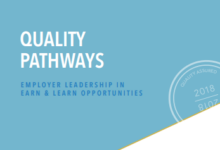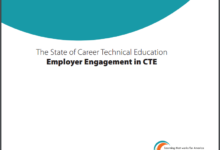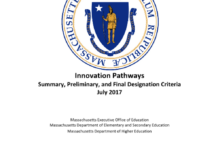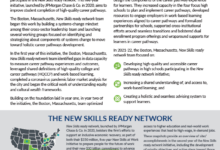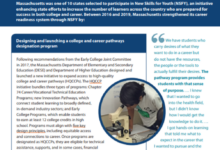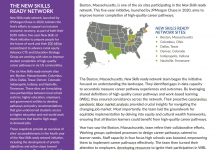In 2017, Massachusetts Governor Charlie Baker and the Commonwealth of Massachusetts launched the High Quality College and Career Pathways (HQCCP) initiative, as an extension of the work completed in previous years by the Massachusetts Workforce Skills Cabinet. This initiative, which was launched with support through JPMorgan Chase & Co.’s New Skills for Youth grant, accelerated efforts to develop career pathways for learners across the state.The two main models identified by the Commonwealth to support career pathways, in addition to Career Technical Education (CTE) pathways, are are 1) Early College (EC) and 2) Innovation Pathways (IP).
Innovation Pathways are designed to cultivate partnerships with employers to give learners an opportunity to deepen their knowledge and skills in a chosen career pathway before graduating from high school. The pathways align with an industry sector in demand within the regional and state economy to ultimately guide learners in making connections from their high school experience to relevant postsecondary education and training. The Innovation Pathways created an opportunity for Massachusetts to offer the 4,500 learners who were once waitlisted for CTE programs within their vocational high schools to participate in CTE or career-focused classes more quickly than years prior. Learners can attend their local high schools and participate in hands-on, career-focused curriculum experiences.
In 2019, the Baker Administration announced the availability of $1.8 million in grants for districts across the state to focus on developing programs preparing learners for college and careers. Governor Baker’s administration recently awarded nearly $452,000 in planning grants to support the Innovation Pathways initiative. These grants were awarded to 20 school districts to promote designation of their school’s Innovation Pathway programs by the spring of 2022. Before a school can be designated as an Innovation Pathway school, they agree to the following design principles:
- Equitable access
- Guided academic pathways
- Enhanced student support
- Connected to career
- Effective partnerships
The individualized planning process gives learners an opportunity to decide which pathway best suits their career interest to promote a seamless transition into postsecondary opportunities. The benefit for learners upon graduating from high school is they will receive at minimum college credits, at no cost to them, and 100 hours of work based learning. This gives learners the springboard to gain postsecondary and on-the-job experience simultaneously.
The Innovation Pathways initiative released under the Baker-Polito Administration aligns specifically with the Boston, Massachusetts partnership in the New Skills ready network (NSrn), which provides equitable access to career pathways. Under the NSrn, Boston has commited to collaborative, systems-level work to extend CTE opportunities for all learners while dismantling equity barriers.
Policy in Action
In 2020, impact data was released to determine the effectiveness of the implementation of Early College and Innovation Pathways. The IP program impact data produced these key findings:
- IP students were over two times more likely to graduate with completion of the Massachusetts Core Curriculum (a college readiness indicator) than comparison students.
- IP students had significantly higher attendance rates than comparison students (95 percent vs. 92 percent)
- IP students had 40 percent fewer disciplinary incidents than the comparison group.
There are currently 49 high schools in Massachusetts with Innovation Pathways offering over 120 pathways. As a commitment to continue supporting the implementation, operation, and expansion of Innovation Pathways, Governor Baker has reserved an investment of $600,000 in the state’s 2022 budget.
Related Links
- Guide to Creating College & Career Pathways
- Press Release: Baker-Polito Administration Awards More Than $450,000 in Innovation Pathways Planning Grants
- Press Release: Baker-Polito Administration Announces $1.8 Million from American Student Assistance for High Schools to Launch Innovation Pathways Programs
- Report: Massachusetts Innovation Pathway & Early College Pathway Program Evaluation Impact Report
Last Updated January 2022

